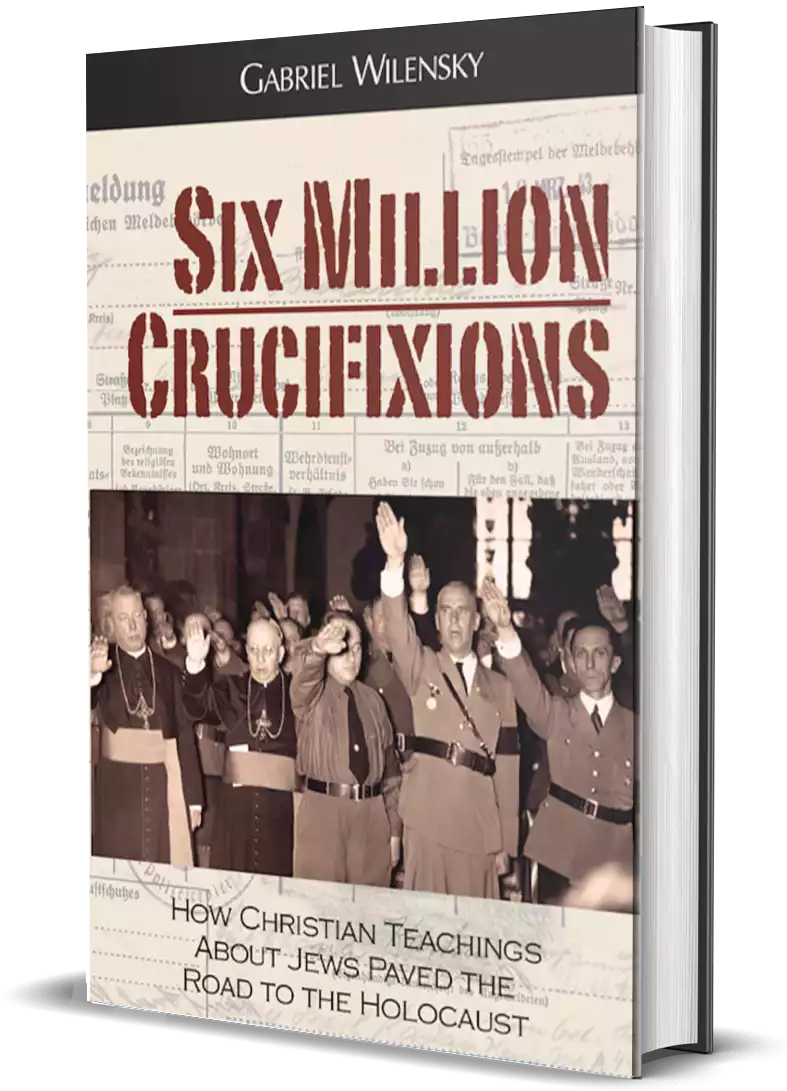The Fear to Act on Behalf of the Jews:
Making the Situation Worse – Really?
Pope Pius XII and the Catholic Church, and the cohorts of church apologists today, often argued that the pope had to remain silent about the mass extermination of Jews during the Second World War in order to prevent an even worse assault on Jews. The reality is that millions of Jews were mercilessly murdered, including over 1000 from the pope’s neighborhood, while the Vatican largely looked the other way. It’s disingenuous to claim that the pope was afraid that by speaking out on behalf of the hounded Jews things would become worse. There was no way things could have been worse; the Germans were killing about 10,000 Jews in Auschwitz every day—and that was just one of the death camps. They were not killing more because they did not have the capacity. Nothing the Pope could have done or said would have made that hell worse. Papal apologists often argue that in Holland the church’s protestation against the deportation of “non-Aryan Catholics” provoked the ire of the Germans, who not only deported all the non-Aryan Catholics, but also the Jews. But the example of what happened in Holland is misleading, for two reasons. First, because the Church’s protest was about Jews that had converted to Catholicism, that is, no longer Jews from neither a Jewish nor a Catholic perspective, and second because the Germans would have killed those converted Jews anyway. To the Germans a baptized Jew was still a Jew, so the fact that the Church spoke out did not precipitate their deportation: their ancestry did.
Sometimes the argument is that the pope was trying to protect the thousands of Jews under the protection of the Church, in the various monasteries and convents in Italy. But this is a weak argument to explain the pope’s reticence to confront the greatest crime in history, because even though it’s very true that the Nazis would have likely invaded the Vatican, raided all Church properties and deported and murdered all Jews sheltered there, that would have still been less than the number of Jews that the Germans were killing in Auschwitz every day. The pope must have asked himself the question of whether it was worth risking those lives by clearly and forcefully admonishing the faithful everywhere to refrain from participating in any way in the “Final Solution”, and yet he chose to remain silent. Ultimately, he may have saved those few thousand at the expense of several million.
“There was no way things could have been worse; the Germans were killing about 10,000 Jews in Auschwitz every day—and that was just one of the death camps. They were not killing more because they did not have the capacity. Nothing the Pope could have done or said would have made that hell worse.”
The church is the self-avowed protector of morals. Instead, they proved to be the self-avowed protector of Vatican interests. Maybe if the pope and the curia were so concerned with their well-being and/or the consequences of them being killed or kidnapped they could have moved to the relative safety of London, Lisbon or New York and broadcast and directed the faithful from there. They would not have been the first government to do that, and it would not have been the first time the papacy moved its seat elsewhere when things got uncomfortable in Rome. But the pope was obsessed with protecting Rome from bombardment. There’s a reason why the British ambassador to the Holy See, Sir Francis D’Arcy Osborne, wrote: “I am revolted by Hitler’s massacre of the Jewish race on the one hand and, on the other, the Vatican’s apparently exclusive preoccupation . . . with the possibilities of the bombardment of Rome.” Pope Pius was not in good standing with the British Foreign Office in general, actually, as after his meeting with Croatian mass murderer Ante Pavelic in 1941 the Foreign Office described the pope as “the greatest moral coward of our age.”
If the Vatican had done the right thing and had acted morally it would have forfeited its ability to protect the Vatican and its treasures, its considerable economic interests in Germany, its chance to be a peace broker, and its ability to protect people, in what I believe was their priority order. But the concept of charity and sacrifice is not new to Christianity. There were thousands of Christians across Europe, including many nuns, priests and other members of the clergy, who displayed Christian charity and helped Jews, sometimes even putting their lives at risk. Many apologists for the pope believe that all this was done at the behest and under direct instruction of Pope Pius, but as far as I know (and of course I could be proven wrong) there is no credible evidence of this. No, these people acted out of their own volition. Sure, he may have opened the doors of Castel Gandolfo and given shelter to 2-3 thousand Jews, but what about the other thousands of other church properties scattered around Europe, including his own 1000+ room palace in the Vatican? What about the other six million who were denounced, rounded up and killed by people who never heard from their pope, their bishops, their parish priests, or even by their military chaplains, that murdering Jews was a crime and a mortal sin?
Even when the Jews of Rome were deported to their deaths in Auschwitz the pope chose to remain silent. He seems to have made some private, ineffective attempt to prevent the deportation, but he chose not to stand up and impose his moral authority. As the German ambassador to the Vatican Weizsäcker reported to his superiors, “Although under pressure from all sides, the Pope has not let himself be drawn into any demonstrative censure of the deportation of the Jews of Rome.” Even though ultimately this is just speculation, I think that the pope could have stood in front of the train carrying Rome’s Jews as it was departing Rome toward Auschwitz. Even if the Germans had forcibly removed him from the tracks, the impression this symbolic gesture would have had would have been so powerful that it would have, if not halted the machinery of destruction, certainly saved many lives and firmly and honestly cemented the Church’s moral standing.

Grab Your Copy Today!
Six Million Crucifixions
Traces the history of antisemitism in Christianity and the role that played in making possible the Holocaust.
Want to stay informed about the topic?
Subscribe below.

